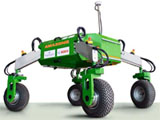Agricultural and Biological Systems Engineering, Department of

Department of Agricultural and Biological Systems Engineering: Faculty Publications
ORCID IDs
0000-0003-0488-0642
Document Type
Article
Date of this Version
2019
Citation
Sensors 2019, 19, 1112
Abstract
Recently, unmanned aerial vehicles (UAVs) have rapidly emerged as a new technology in the fields of plant protection and pest control in China. Based on existing variable spray research, a plant protection UAV variable spray system integrating neural network based decision making is designed. Using the existing data on plant protection UAV operations, combined with artificial neural network (ANN) technology, an error back propagation (BP) neural network model between the factors affecting droplet deposition is trained. The factors affecting droplet deposition include ambient temperature, ambient humidity, wind speed, flight speed, flight altitude, propeller pitch, nozzles pitch and prescription value. Subsequently, the BP neural network model is combined with variable rate spray control for plant protection UAVs, and real-time information is collected by multi-sensor. The deposition rate is determined by the neural network model, and the flow rate of the spray system is regulated according to the predicted deposition amount. The amount of droplet deposition can meet the prescription requirement. The results show that the training variance of the ANN is 0.003, and thus, the model is stable and reliable. The outdoor tests show that the error between the predicted droplet deposition and actual droplet deposition is less than 20%. The ratio of droplet deposition to prescription value in each unit is approximately equal, and a variable spray operation under different conditions is realized.
Included in
Bioresource and Agricultural Engineering Commons, Environmental Engineering Commons, Other Civil and Environmental Engineering Commons


Comments
© 2019 by the authors.
Open access
doi:10.3390/s19051112